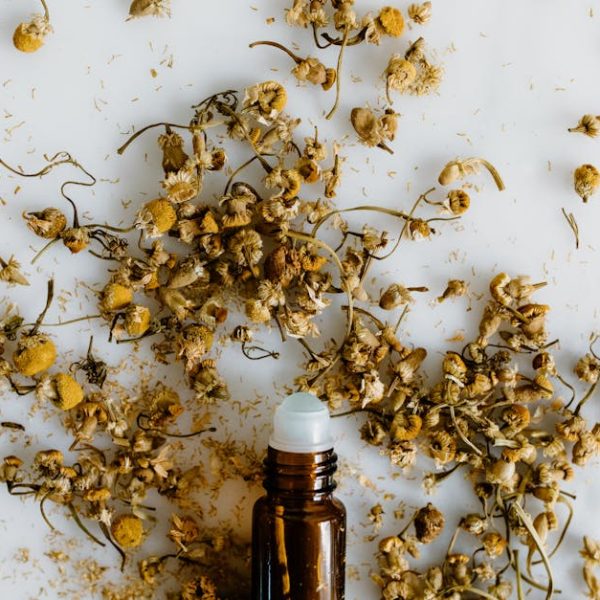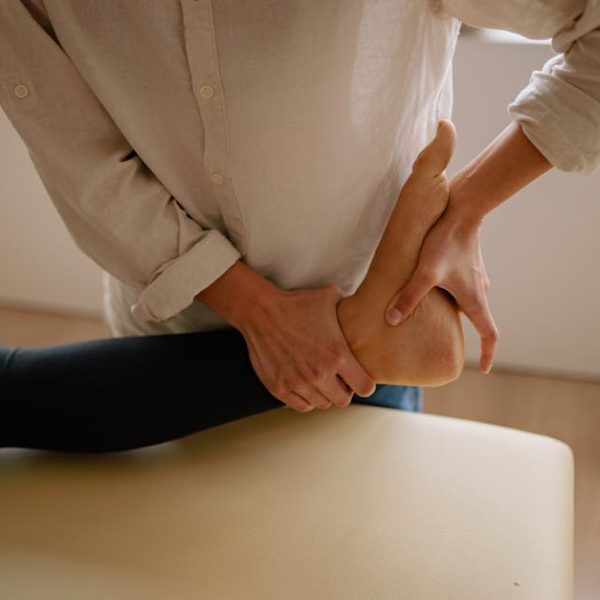Do you struggle to fall asleep or sleep restlessly during the night? If so, Lavender oil is your go-to. Revered for its calming and relaxation properties, this mighty oil has been scientifically proven to alleviate insomnia and enhance sleep quality.
Pro tip: Diffuse some drops of Lavender oil in your bedroom before sleep, add a few drops to your warm bath, or spray it onto your pillow. You’ll note a significant improvement in your sleep cycle.
Here’s a checklist for Lavender oil usage:
- Avoid contact with eyes and broken skin.
- Dilute it adequately before topical application.
- If pregnant or under medication, consult a healthcare professional before use.
Chamomile Oil: Nature’s Sleep Inducer
Chamomile oil, mother nature’s sleep inducer, has soothing effects that reduce anxiety and promote sound sleep. It has long been used as a natural remedy for insomnia and a variety of sleep disorders.
The best practice involves massaging a few drops of Chamomile oil mixed with a carrier oil into your temples or adding it to your bedtime bath.
Interestingly, there are two variants of Chamomile- the Roman Chamomile and German Chamomile. While both are beneficial for improving sleep, the Roman variety is commonly employed for its sedative effects.
Sandalwood Oil: For Deeper Sleep
Sandalwood oil, cherished for its profound calming properties, helps stimulate mental clarity and reduce anxiety, thus enabling a deeper sleep experience.
However, it’s equally important to exercise caution when using Sandalwood oil. It’s potent, so always dilute it properly and avoid usage if you’re pregnant.
Cedarwood Oil: The Natural Sedative
If you’re battling insomnia, Cedarwood oil can be your best companion. With its potent sedative properties, it helps stimulate the production of melatonin, the sleep-inducing hormone, helping you fall asleep faster and stay asleep longer.
Comparatively, Cedarwood oil is just as effective as other common sleep remedies. For heightened benefits, consider blending it with Lavender or Chamomile oil.
Remember to exercise caution as Cedarwood oil is potent. Dilute it adequately before applying it topically and avoid using it if you’re pregnant or breastfeeding.
Valerian Root Oil: The Ancient Sleep Enhancer
Valerian Root oil’s history as a sleep aid dates back to ancient times, and it’s still trusted today to combat sleeping problems. Extracted from the Valerian plant, it has been used for centuries to treat insomnia and anxiety.
Applying Valerian Root oil to the bottoms of your feet or palms or using it in a diffuser can help reduce sleep latency and improve sleep quality.
However, it’s worth noting that Valerian Root oil can cause drowsiness and grogginess, so avoid using it before driving or operating any machinery.
Bergamot Oil: Unwind and Relax
Be soothed into serenity with the refreshing aroma of Bergamot oil. It is hailed for its calming effect, diminishing feelings of stress or anxiety, making it a great aid for insomnia sufferers.
Pro tip: Incorporate Bergamot oil into your bedtime routine by using it in an oil diffuser or adding it to your evening bath.
Research studies have confirmed the positive impact of Bergamot oil on improving sleep quality, making it a natural and effective choice.
Ylang Ylang Oil: For a Restful Night
Meet Ylang Ylang oil, your sleep knight in shining armor. This oil helps you unwind, promoting restful and restorative sleep with its gentle, soothing scent.
For effective use, add a few drops to your diffuser or dilute it with a carrier oil and apply to the back of your neck or bottoms of your feet.
Be wary, though, as overuse of Ylang Ylang oil can possibly lead to headaches or nausea. Moderation is the key to unlock its benefits!
Vetiver Oil: The Sleep Stabilizer
Vetiver oil is known for its grounding effects which can stabilize your sleep pattern and combat insomnia.
For the best outcome, apply the diluted Vetiver oil to your soles or the back of your neck. It can also be combined with other sleep-boosting oils like lavender and chamomile.
Numerous scientific studies back Vetiver oil’s claims of sleep improvement, solidifying its place in your night routine.
Clary Sage Oil: The Stress Reliever
Unwind your day with the stress-busting properties of Clary Sage oil. Its ability to relax the mind and body promotes better sleep hygiene contributing to improved sleep quality.
The oil pairs well with lavender and chamomile, creating a triple-threat against insomnia.
However, moderation is necessary when using Clary Sage oil, as excessive use could lead to headaches or dizziness. Also, avoid its use during pregnancy.
Marjoram Oil: For Sleep Quality Improvement
Marjoram oil, popularly known for soothing nerves, can greatly improve sleep quality. This oil helps your body relax, preparing it for a refreshing night’s sleep.
Before applying Marjoram oil, remember the following:
- Always dilute it with a carrier oil as it can cause skin irritation.
- Pregnant women and children should refrain from use unless under professional advice.
- Marjoram oil has potential interactions with certain medications, so always consult a healthcare professional before use.
To sum up, incorporating essential oils into your nightly routine can be a natural and effective way to combat insomnia and improve sleep quality. To optimize their effects, consider blending them or applying them in different ways that suit your preferences. As always, be aware of potential risks and be sure to talk to a professional if you’re pregnant, breastfeeding, or on any medication. Sleep well!
Key Takeaway:
- Lavender, Chamomile, Sandalwood, Cedarwood, Valerian Root, Bergamot, Ylang Ylang, Vetiver, Clary Sage, and Marjoram oils have different beneficial properties that can alleviate insomnia and enhance sleep quality.
- Each essential oil can be utilized in different ways such as diffusion, adding to a warm bath, or applying it topically (after proper dilution).
- Some oils are potent and require careful usage. Always seek professional advice if pregnant, breastfeeding, under medication, or in case of any health concerns.
Courageously embrace your sleep journey. Introduce these oils into your bedtime routine and acknowledge their power to help you sleep better. Remember, don’t be afraid to experiment until you find the perfect oil combination that works for you. Now, turn off the lights, inhale the calming scents, and have a blissful slumber!
FAQs
Q: Can I use multiple oils at the same time for sleep improvement?
A: Yes, indeed! You can blend different oils to enhance their effects, but it’s important to do so carefully and thoughtfully to ensure they complement each other. Ensure you understand the properties of each oil before mixing.
Q: Are essential oils safe to use with children?
A: While some essential oils can be used safely with children, it’s essential to consult a healthcare professional before introducing them to a child’s routine. Always dilute the oils adequately and use them in smaller amounts.
Q: Can I ingest essential oils to improve sleep?
A: No, not all essential oils are safe for ingestion. The safest way to use them is by inhalation or topical application after diluting with an appropriate carrier oil.
Q: Do I have to use a carrier oil for topical application?
A: It’s strongly advised to dilute essential oils with a carrier oil before applying it to the skin to prevent irritation or potential allergic reactions.
Q: How long does it typically take to see improvements in sleep after starting to use essential oils?
A: It varies for each individual. Some may notice improvements within a few days, while others may take a few weeks. Consistency and establishing a routine can aid in seeing improvements faster.
Love this post? Why not share it! Also, explore more articles on our website to keep learning.






